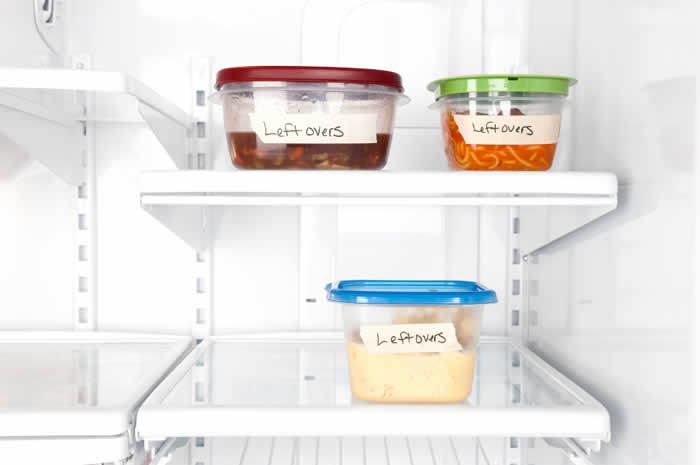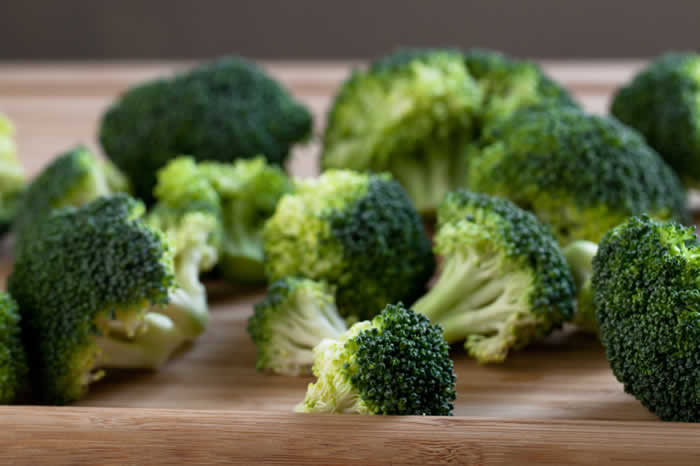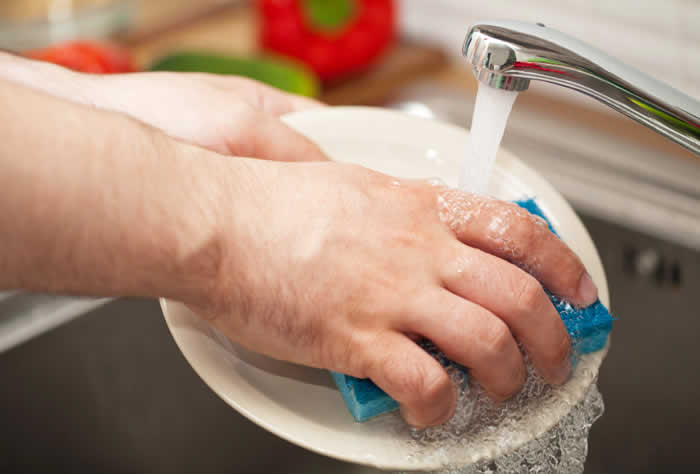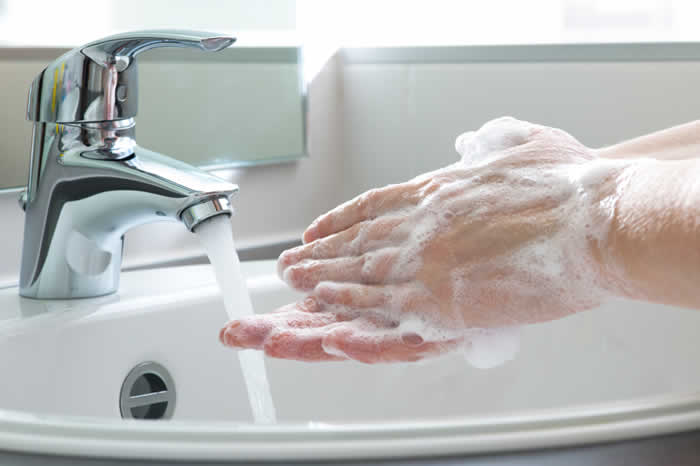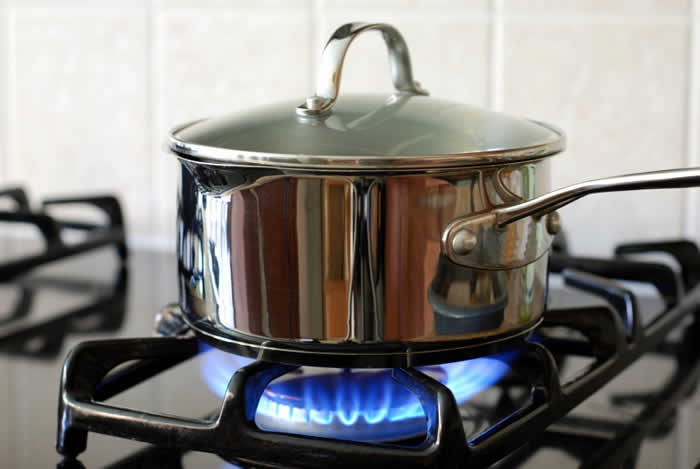When you’re in the kitchen, safety is obviously pretty important. That’s why you don’t plunk down raw meat right onto your kitchen counter or use expired ingredients. It’s also probably why your mom warned you not to eat raw cookie dough. But no matter how much you think you know about food safety, it’s easy to make some pretty gross food prep mistakes without even realizing it. Unfortunately, some of the mistakes you may be making when you’re preparing or cooking your food can make you and your family sick.
[contentblock id=1 img=adsense.png]
Even the best home cook may be guilty of messing up on food safety. And we’re not talking about using milk that smells fine, but is a day or two past its use-by date. (Seriously, everybody does that.) Unfortunately, there are some bigger mistakes that you may be making. Mistakes that can ruin your food and perhaps even send you to the emergency room. Read on to find out what you should avoid, and to make sure that you and the family members who trust you to feed them aren’t going to be the next victims of a foodborne illness or runaway bacteria growth.
10. Cooking with or eating food that should have been thrown out
If you haven’t been to the grocery store in a week, it can be tempting to throw a meal together with whatever’s left in the fridge. But that’s a bad idea if you’re cooking with or eating food that should have been thrown out. At the top of the list of Foodsafety.gov’s list of dangerous food mistakes is tasting food to see if it’s still good, since you won’t be able to taste, smell, or see the bacteria that cause food poisoning. But eating even a tiny amount can cause serious illness.
9. Buying food that’s already compromised
When you wash your produce, you probably inspect it to make sure that it doesn’t have bruises, holes, or signs of insect damage. You should also inspect your food when you’re buying it to avoid purchasing something that’s already compromised and may make you sick. That’s important when you’re buying produce, but also when you’re buying refrigerated, canned, and frozen foods. The FDA advises shoppers, particularly those shopping at surplus stores, not to buy cans that are swollen, since bulges might indicate dangerous bacterial growth. Don’t buy cans that are dented or rusted along the seams. Also, don’t buy anything in a torn package, or frozen packages with food stains.
8. Washing meat or poultry
You should wash your fruits and vegetables, but you should never wash meat in the sink. It may seem like a good way to get rid of some of the bacteria lingering on the outside of the meat — but it’s actually a pretty bad idea. According to Foodsafety.gov, washing meat or poultry can spread dangerous bacteria to your sink, to your countertop, and to the other surfaces in your kitchen. Just think about how easy it is to splash water out of the sink and onto the surrounding walls, cabinets, cookbooks, and appliances. To be safe, just don’t wash meat, poultry, or even eggs in your sink.
Read More: 5 Brain-Boosting Foods That Will Make You Smarter
7. Neglecting to wash produce
You might think that you don’t have to wash your produce. Particularly if it’s been washed, bagged, and sealed. But as Food52 notes, the majority of recent food illness outbreaks have been traced to raw fruits, nuts, or vegetables. You should always wash your produce, no matter what promises the packaging makes about the product’s cleanliness. Food52 advises using a solution of water with 10% vinegar (a 10:1 ratio). Or, you can use a store-bought, organic solution that’s made specifically for the purpose. Ohio State University’s medical center also says that you can run your produce under running water and rub with friction for 20 seconds. Just make sure that you don’t set unwashed produce down on your cutting board, since any pesticides or germs will then be able to contaminate the cut produce.
6. Failing to thoroughly clean your kitchen
You probably wash your dishes regularly and thoroughly. But chances are that you haven’t properly cleaned your kitchen in a long time. You should scour your sink regularly. (Food52 recommends mixing a gallon of water with a tablespoon of Clorox Bleach, and making sure it stays in contact with the surface for at least two minutes. Then, let it air dry.) You should microwave your sponge for one minute, or put it in the dishwasher with the dryer setting on. Wash your cutting boards and other equipment between each use. If produce, for instance, is infected with pathogens, it can leave germs on your cutting board and knife.
[contentblock id=2 img=adsense.png]
5. Not washing your hands often or thoroughly enough
Another crucial piece of advice from Food52? Washing your hands properly is one of the best defenses against foodborne illnesses, no matter what you’re cooking. Don’t settle for a cursory rinse or a lazy soaping-up when you start to cook, or after you’ve handled ingredients like meat. “Treat the kitchen like an operating room, and scrub up like you’re preparing for surgery,” Food52 advises. “Use a brush to get under your fingernails, and wash your hands with soap under running water for a full 30 seconds.”
4. Neglecting to keep foods at their proper temperature
The guidelines from Ohio State University also note that it’s important to keep foods at the appropriate temperature. Hot foods should be kept above 140 degrees Fahrenheit. Cold foods need to be below 41 degrees Fahrenheit. If you cook a meal and know you’ll have leftovers, refrigerate only as much as you’ll use within three to five days, and freeze the rest within two hours of cooking. Reheated foods should reach 165 degrees Fahrenheit, or a rolling boil, before eating. Foodsafety.gov notes that it’s also important to thaw and marinate foods safely. That means in the refrigerator, in cold water, or in the microwave, not out on your counter.
Read More: 7 Foods That Will Help You Grow Muscle
3. Serving raw or undercooked food to someone with a compromised immune system
As Food52 explains, “good hygiene and cooking techniques lower the germ count enough that a normal immune system can take care of what remains.” But if you or someone in your family is immunocompromised, you’re going to need to make some adjustments. You should never serve food cooked at low temperatures to people with compromised immune systems. According to guidelines from the Ohio State University’s medical center (PDF), foods like sushi, eggs with runny yolks, or homemade Caesar dressing are a no-go for anyone who’s immunocompromised. It’s crucial that you follow the dietary guidelines carefully if you’re feeding anyone with a weakened immune system.
2. Not using a food thermometer
Even if you decide, for instance, to cook a piece of meat for longer at a lower temperature rather than more quickly at a higher temperature, it’s important to ensure that it achieves the goal temperature to kill the bacteria. The FDA advises that color and texture are unreliable indicators of safety. Using a food thermometer is the only way to safely cook meat, poultry, seafood, and egg products. If you want to be confident that these foods are cooked adequately and aren’t going to make you sick, you need to use a food thermometer.
[contentblock id=3 img=gcb.png]
1. Undercooking your food or ignoring cooking time
The Food and Drug Administration and the United States Department of Agriculture recommend safe cooking temperatures to kill bacteria. But they ignore cooking time, the other crucial part of the equation. You can either cook your food to an FDA-recommended temperature for a second or two to kill the bacteria, or you can maintain lower temperatures for a longer amount of time. Use a sous vide water bath, for instance, to maintain a constant temperature for a longer cooking time.


